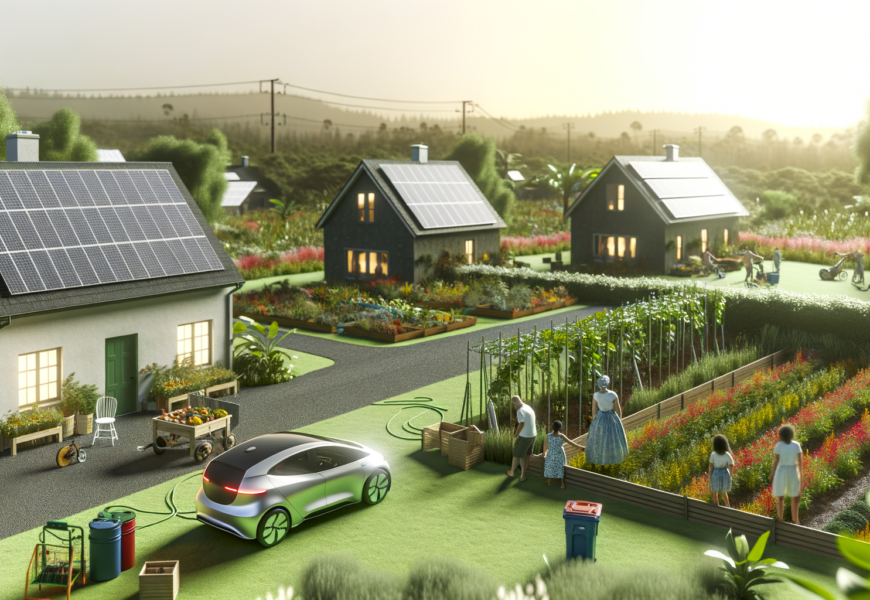Meta Description:
Explore Sustainable Living 2024 with our comprehensive guide. Learn about eco-friendly practices, green technologies, and lifestyle changes that promote sustainability and help protect our planet.
Welcome to Sustainable Living 2024, your ultimate resource for embracing a greener lifestyle. As global awareness of environmental challenges continues to grow, more and more people are seeking ways to reduce their ecological footprint and create a positive impact on the planet. In this guide, you will discover practical tips, innovative technologies, and inspiring stories that will empower you to live sustainably. Join us as we explore the various facets of sustainable living, from energy-efficient homes to zero-waste practices, and everything in between.
Understanding Sustainable Living
Sustainable living is about making choices that reduce our impact on the environment. It means using resources mindfully and ensuring that our actions today do not harm future generations. Historically, sustainability has evolved from a niche concept to a global movement, influenced by environmental pioneers and driven by the urgent need to combat climate change, pollution, and resource depletion.
The core principles of sustainable living include conservation of resources, reduction of waste, and fostering environmental health. These practices benefit not only the planet but also our communities and individual well-being, promoting a healthier lifestyle and often reducing costs in the long run.
Energy Efficiency in 2024
As we move into 2024, advancements in renewable energy technologies continue to shape our energy landscape. Solar panels and wind turbines are becoming more efficient and affordable, making it easier for households and businesses to transition to green energy solutions. Emerging technologies like energy storage systems and smart grids further enhance the reliability and efficiency of renewable energy sources.
To conserve energy at home, consider investing in energy-efficient appliances, which can significantly reduce electricity consumption. Simple changes such as sealing leaks, adding insulation, and using LED lighting can also contribute to lower energy bills. Case studies show that energy-efficient homes not only save money but also improve comfort and reduce environmental impact.
Sustainable Transportation
The transportation sector is a major contributor to carbon emissions, but significant progress is being made. Electric and hybrid vehicles are rapidly gaining popularity, thanks to advancements in battery technology and expanding charging infrastructure. These vehicles offer numerous benefits, including lower operating costs and reduced emissions.
Public transportation and cycling are excellent alternatives to driving, offering additional health benefits and reducing traffic congestion. Innovative solutions like car-sharing programs, electric scooters, and bike lanes are being integrated into urban planning to support sustainable commuting. By choosing these options, we can collectively reduce our transportation carbon footprint.
Eco-Friendly Home Design
Green architecture is transforming the way we build and live. Sustainable building materials such as reclaimed wood, bamboo, and recycled metal are now widely available, reducing the need for new resource extraction. Incorporating smart home technologies, like programmable thermostats and energy management systems, can further enhance the sustainability of our homes.
Indoor plants not only beautify living spaces but also improve indoor air quality by filtering pollutants. Globally, there are inspiring examples of eco-friendly home designs that blend aesthetics with sustainability. These homes often use renewable energy sources, efficient water systems, and sustainable materials that set new standards for greener living.
Zero Waste Lifestyle
The zero-waste movement is gaining momentum as individuals strive to minimize their waste output. Simplifying your life by reducing, reusing, and recycling is at the heart of this philosophy. Start by using reusable bags, bottles, and containers to cut down on single-use plastics. Composting kitchen scraps can also significantly reduce household waste while enriching your garden soil.
Many businesses are also embracing zero-waste practices, from eliminating plastic packaging to setting up recycling programs. Companies are increasingly aware that sustainable practices can boost their public image and reduce operational costs, creating a win-win situation for the environment and the economy.
Sustainable Food Choices
Food production has a significant environmental impact, but making conscious choices can lead to more sustainable consumption. A plant-based diet is one of the most effective ways to reduce your carbon footprint, as plant-based foods typically require fewer resources than animal products.
Opting for organic and locally-sourced foods supports sustainable farming practices and reduces transportation emissions. Growing your own vegetables, participating in community gardening, and supporting local farmers' markets are excellent ways to ensure your food is fresh, nutritious, and environmentally friendly.
Lastly, reduce food waste by planning meals, storing food properly, and repurposing leftovers. By valuing the food we consume, we can make a positive impact on the environment and promote a more sustainable food system.
Water Conservation Strategies
Water is a precious resource, and its conservation is critical for sustainability. Start by implementing simple measures such as fixing leaks, using water-efficient fixtures, and collecting rainwater for gardening. Innovations in water-saving technologies, like low-flow showerheads and smart irrigation systems, can drastically reduce water usage.
Successful initiatives around the world demonstrate how collective efforts can lead to significant water savings. From cities implementing large-scale water recycling programs to communities adopting greywater systems, these efforts showcase the effectiveness of innovative water management practices.
Community and Global Initiatives
Community actions play a vital role in promoting sustainability. Local projects, such as community gardens, recycling programs, and sustainability workshops, raise awareness and foster collective responsibility. Participating in these initiatives can strengthen community bonds and create a shared commitment to environmental stewardship.
On a global scale, sustainability initiatives and agreements, such as the Paris Agreement, aim to combat climate change and promote sustainable development. These efforts highlight the importance of international cooperation and the need for systematic changes to address environmental challenges effectively.
Getting involved in local sustainability efforts can be as simple as volunteering for a cleanup drive, supporting green policies, or joining a local environmental group. Every action, no matter how small, contributes to the larger goal of achieving a sustainable future.
Conclusion
In conclusion, Sustainable Living 2024 offers a roadmap to a greener and more sustainable future. By adopting the practices outlined in this guide, you can significantly reduce your environmental impact and contribute to a healthier planet. Start implementing these changes today and join the growing movement towards sustainability. Together, we can make a difference. Remember, every small step counts!
For additional tips, insights, and success stories, explore our other blog posts and resources. Engage with our community by sharing your sustainability journey in the comments below or on social media. Let's inspire each other and work collectively towards a brighter, greener future!










